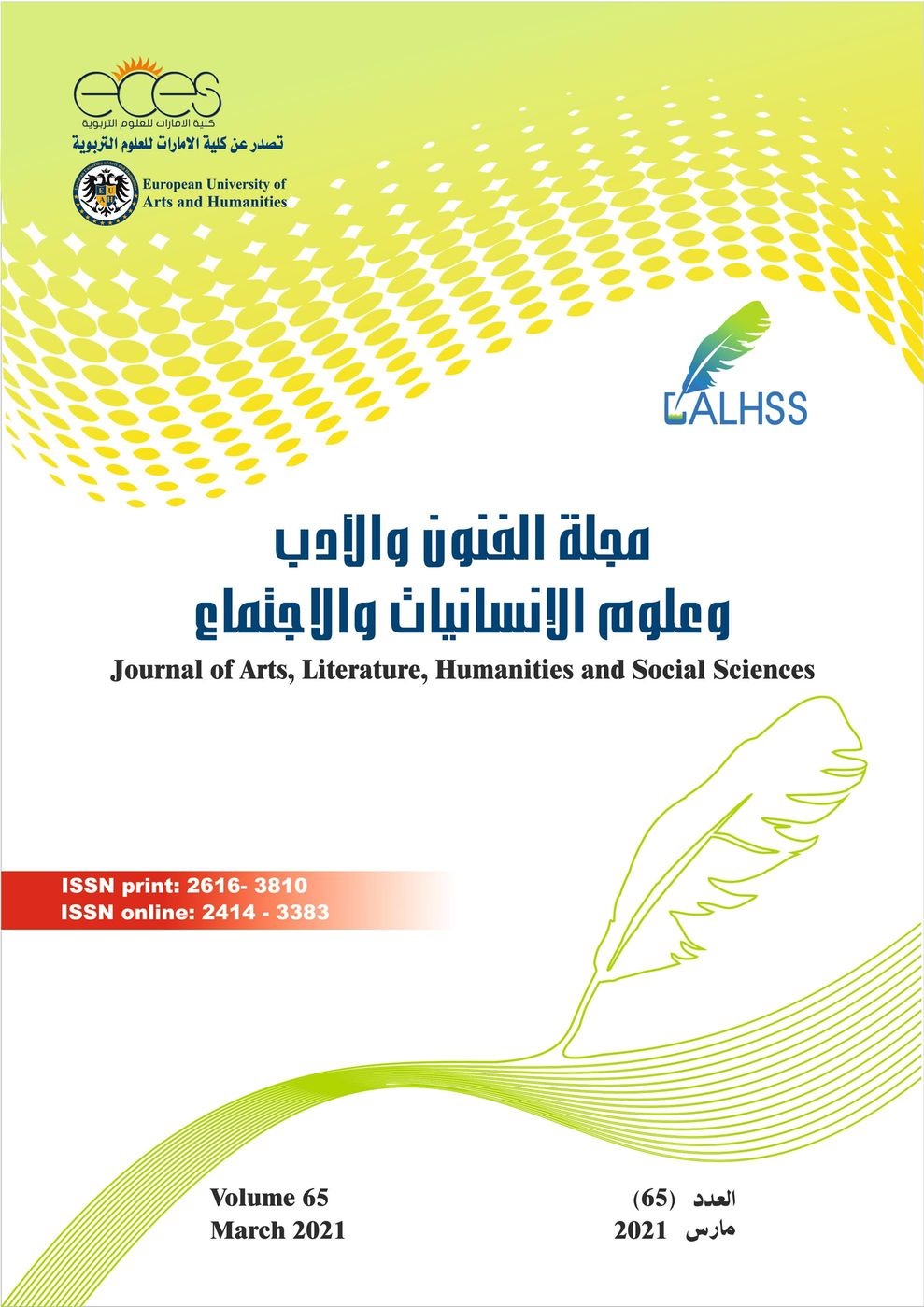The Orientation of Religiosity & its Relationship with Mental health among the Social Workers in The Schools of Muscat Governorate
Abstract
This study aimed at identifying the relationship between religiosity and mental health among the social workers. The study sample consisted of 151 social workers; 50 males and 101 females who work in the schools of Muscat Governorate during the academic year 2016/2017, where the researcher applied the scale of the list of basic and virtual religiosity, and the scale of mental health after verifying the characteristics of validity and reliability for each of them. The results showed that the level of virtual religiosity among the stud sample individuals was low, with a mean of 1.89, while the level of basic religiosity was high with a mean of 4.08. The results also showed the high levels of mental health among the stud sample individuals. The results showed that there is a statistically significant inverse relationship between the level of virtual religiosity and the scale of mental health, and that there is a statistically significant positive relationship between the level of basic religiosity and the scale of mental health. The results showed that there are no statistically significant differences in the level of virtual religiosity for the male and female respondents of the study, while there are statistically significant differences in the trend of basic religiosity and in favor of males. While there were no statistically significant differences in the level of mental health in the sample of male and female social workers due to the variable of gender. The results showed that the orientation of religiosity among the social workers contribute positively in predicting the mental health among them.
References
2. بوعود، أسماء. (2014). التدين والصحة النفسية: مقارنة سيكولوجية دينية. عالم التربية، مصر، 15، 48، 323-352.
3. البهدل, دخيل (2013).وجهة التدين لدى المرشد الطلابي وعلاقتها بصحته النفسية وأدائهالإرشادي.رسالةماجستير غير منشورة,مجلة جامعة ام القرى للعلوم التربوية والنفسية.
4. جان، نادية (2008). الشعور بالسعادة وعلاقته بالتدين والدعم الاجتماعي والتوافق الزواجي والمستوى الاقتصادي والحالة الصحية. دراسات نفسية، 18، 4، 601-648.
5. الحديبي، مصطفى عبد المحسن (2007). فعالية الإرشاد الديني في خفض قلق المستقبل المهني لدى طلاب كلية التربية بأسيوط. رسالة ماجستير غير منشورة، ماجستير في التربية، كلية التربية، جامعة أســيوط، مصر.
6. الحسين، سليمان. (2006). التدين وعلاقته بالعصاب والانبساط. دراسات الطفولة، ابريل، (103-118).
7. الخضر، عثمان (2000). التدين والشخصية أحادية العقلية، دراسات نفسية، 10، 1، 3-28.
8. زهران، حامد عبد السلام (1995). الصحة النفسية والعلاج النفسي. مصر، القاهرة: عالم الكتب.
9. زهران، حامد عبد السلام (2003). دراسات في الصحة النفسية والإرشاد النفسي. القاهرة: عالم الكتب.
10. زيدان, يوسف (2013). دوامات التدين. القاهرة: دار الشروق, ط1.
11. سعيد, ياسر نظام مجيد (2002). بناء مقياس الصحة النفسية لطلبة الجامعة على وفق مؤشرات مقياس منسوتا المتعدد الأوجه m.m.p.i. إطروجة دكتوراه غير منشورة, جامعة بغداد, كلية التربية.
12. صالح، فاطمة (2007). الالتزام الديني وعلاقته بالصحة النفسية لدى طلبة كلية العلوم الاسلامية. مجلة التربية والتعليم، 14، 4، 329-359.
13. الصنيع، صالح (2000) التدين والصحة النفسية. المملكة العربية السعودية، وزارة التعليم العالي، جامعة الإمام محمد بن سعود الاسلامية، عمادة البحث العلمي.
14. عبد الخالق، احمد (2010). التدين والحياة الطيبة والصحة النفسية لدى عينة من طلاب الجامعة الكويتيين. دراسات نفسية، 20، 3، 503-520.
15. القريطي, عبد المطلب والشخص, عبد العزيز (1992). مقياس الصحة النفسية للشباب, مكتبة الأنجلو المصرية, القاهرة.
16. عقيلان, نهاد (2011). الإتجاه نحو الإلتزام الديني وعلاقته بالتوافق النفسي لدى طلبة جامعة الأزهر بغزة.رسالة ماجستير غير منشورة، غزة, جامعة الأزهر.
17. غلاب، محمود والدسوقي، محمد (1994). دراسة نفسية مقارنة بين المتدينين جوهرياً والمتدينين ظاهرياً في الاتجاه نحو العنف وبعض خصائص الشخصية. " دراسة نفسية، 4، ع 3 (يوليو 1994 م)، 337 - 375.
18. فهيم, كلير(2010).الإيمان والصحة النفسية.ط1. القاهرة: شركة نوابغ الفكر.
19. محمود, حمدي (1997).وجهة التدين وعلاقتها بكل من الاستعداد العقلي والإفراط والتفريط التحصيلي. مجلة كلية التربية بأسيوط, مصر, 1(13),132-171.
20. المفرجي, محمد (2007). معوقات أداء المختص الإجتماعي في المؤسسات التربوية: دراسة ميدانية في محافظة كركوك. رسالة ماجستير غير منشورة, جامعة بغداد, بغداد.
21. المهدي, محمد (2002). سيكلوجية الدين والتدين. الإسكندرية, البيطاش سنتر للنشر والتوزيع, ط1.
22. النجار, عبد المجيد(1410ه). في فقه التدين فهماً وتنزيلاً. [نسخة إلكترونية]. كتاب الأمة, العدد22.
23. ياركندي، هانم بنت حامد (2003)." الصحة النفسية في المفهوم الإسلامي ". المملكة العربية السعودية: عالم الكتب.
24. Batson, C. & Ventis, W. (1982). The Religion Experience: A Social Psychological Perspective. New York, Oxford University. Press.
25.
26. Beshlideh, K. Allipour, S. Shehni, M (2009). The causal Relationship between Religious Belief and Mental Health, with mediating Role of self-esteem inUniversity students. Journal of Education and Psychology. Vol.3, No, 2,pp. 25-38.
27. Dudley, M. (1990). The Importance of Spirituality in Hospice Work: A Study of Hospice Professionals. The Hospice Journal, 3(6), 63-78.
28. Forsyth, J. (2003). Psychological Theories of Religion. New Jersey: Prentice Hall.
29. Hood, W.; Spilka, B; Hausberger, B; & Gorsach, R (1996).The psychology of religion. New York: Guifoed.
30. James, B. & Samwells C. (2003). High stress life events and spiritual development, Journal of Psychology and Theorlogy, 27 (3) 250-260
31. (psychoINFO).
32. Klocker, N, Trenerry, B, and Webster,K (2011). How does freedom of religion and belief affect health and well-being Victorian health promotion foundation (Vic Health), Carlton, Australia.
33. Moreira-Almeida, A, Neto, Fl & Koenig,HG (2006). Religiousness and mental health: areview; Rev.Bras. Psquitar, 28(3): 242-250.
34. Rohrbaugh, J. & Richard, J. (1975). Religiosity in youth: A Personal Control against Deviate Behavior, Journal of Personality, Vol(43), No(1), 136-155.
35. Schumaker, J. (1992). Religion and mental health. New York: Oxford University press.
36. Van Ness, P. & Larson, D. (2002). Religion senescence and mental health: The end of life is not the end of hope, American, J. Geriatric Psychiatry.10, 1, 386-397.
37. Ward, Andrew, M. (2010). The Relationship Between Religiosity and ReligiousCoping to Stress Reactivity and Psychological Well-Bein Dissertation, Georgia State University.



